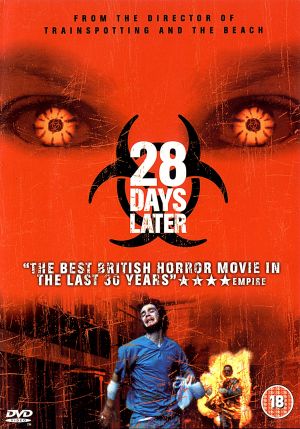
28 DAYS LATER
UK, 2002, 114 minutes, Colour.
Cillian Murphy, Naomie Harris, Megan Burns, Brendan Gleeson, Christopher Eccleston.
Directed by Danny Boyle.
28 Days Later is a blend of science fiction and futuristic speculation. It was written by Alex Garland who wrote the novel, The Beach, filmed by Danny Boyle. Boyle made an impact in British television with a range of telemovies including some of the Inspector Morse series. His breakthrough in films was with Shallow Grave and Trainspotting followed by the very American A Life Less Ordinary and then The Beach. After 28 Days Later he returned to television but also made the delightful children’s religious film, Millions.
The setting is London, an infection has destroyed many of the inhabitants and turned others into zombies. There are very few survivors and they have to make their way to Manchester where they hear a radio broadcast calling people in for safety. However, this refuge is not as it seems.
Cillian Murphy portrays a cycle courier who wakes up in hospital twenty-eight days later and has to discover what has happened to the city. There are powerful scenes as he walks through a deserted London. He meets several survivors and, after some struggles, joins with a father and daughter (Brendan Gleeson and Megan Burns) to drive to Manchester. Christopher Eggleston portrays the military chief who takes in the refugees – but has plans for using the women for reproductive purposes for a future civilisation. Needless to say, mayhem ensues.
The film uses the tradition of many films, especially those of the Living Dead. It also has echoes of such stories as I Am Legend and The Omega Man where a few survivors remain at the end of the world. However, by giving the film a contemporary setting and filming in an authentic London and the British countryside, it gives the film more impact and seems more realistic even as it uses the horror devices of zombie attacks.
1.The impact of the film as drama, as science fiction, as apocalyptic, as horror and using the conventions of zombie and Living Dead films? A successful combination?
2.The imagination about the future, about infection, plagues and viruses, about animal experimentation, about the consequences for humans? Infection and madness? Violence and destruction? The irony of the city remaining the same, the peace of the countryside – and people transformed?
3.The opening: the animal rights, the activists, the chimps, their being freed? The irony of their being infected with rage? The activists attacked, killed? The unleashing of the virus?
4.The mystery as Jim wakes up, the cycle courier, in hospital, abandoned? His wandering the hospital? The wandering of London, empty London, the familiar landmarks? The rescue by Celina and Mark?
5.Celina, her background, the confrontation with Jim? Saving him? Mark and his character, the explanation of the plague?
6.The plague, infection, the blood, transmission by blood, the rapidity of the victims’ succumbing?
7.Jim and the group going to his parents’ house, discovering his parents, their deaths, the note? The pathos? Mark and his being infected? Celina killing him?
8.Wandering London, Celina and Jim defending themselves? The picture of ordinary citizens transformed into monsters? Behaviour, aggression? Going to the flat after seeing the light, finding Frank, Hannah’s resistance, their getting into the apartment and being saved? The radio broadcasts, Frank and his picking them up? The decision to go to Manchester?
9.The drive through the countryside, the tranquil beauty and green of the countryside contrasting with the city? The group going to safety?
10.Stocking up on food, going to the supermarkets? The danger of infection? The pursuit? At the service station, getting the petrol, Frank and his being attacked, bitten? His wanting to save his daughter? His death?
11.Listening to the broadcasts, going up the highways, the military and their attack? The roadblock? The rescue of Jim, Hannah and Celina? Henry and his role, militaristic, welcoming the group?
12.In the mansion, the squad of soldiers, being made to feel at home, the meals? The soldier in the locked room, his being studied for the effects of the infection, his madness and desperation?
13.The truth about the women, their being attacked by the men, their being used for reproduction? The contrast with Jim, the confrontation, his going away for rescue? His return, the fight?
14.Jim, resilience, courage and ingenuity? Freeing the infected soldier? The other soldiers being infected? The mayhem as they destroyed each other? The attempt to escape, Henry and the truck? His being infected? The havoc? The three leaving – and going to find help?
15.The land, the landscape, the survivors, the search plane – and a hope for the future?
16.The particularly British tone of this film, its using the genre and conventions – and the contrast with the more upfront styles of the equivalent American drama?